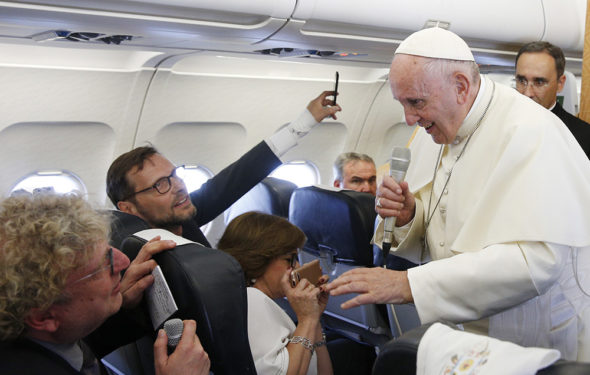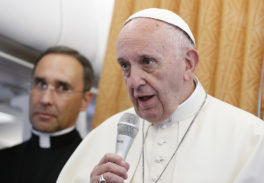
By Christopher White, The Tablet’s National Correspondent
ABOARD THE PAPAL PLANE – After a day of touting ways in which Christians might share in greater unity, that commitment to coming together didn’t prevent Pope Francis from backing the Vatican’s doctrinal watchdog in its decision to insist on caution regarding proposals for intercommunion with Protestants.
On a return flight to Rome on Thursday from a day-long ecumenical pilgrimage to Geneva, Pope Francis said he supported the Vatican’s Prefect for the Congregation for the Doctrine of the Faith, Cardinal-elect Luis Ladaria, in requiring a rethink of a draft proposal from the German bishops that would allow for non-Catholics to receive communion under certain conditions.
Among other items discussed during the 30-minute in-flight press conference was the global migrant and refugee situation – where, once again, Pope Francis reiterated his support for the U.S. Catholic bishops in opposing the Trump administration’s hard line – as well as the challenges of nuclear weapons.
Last month, the Congregation for the Doctrine of the Faith (CDF) rejected the German proposal, which was approved by roughly three-quarters of the bishops during a meeting earlier in the spring. In a letter published this month, cardinal-elect Ladaria said the proposal was “not mature enough to be published.”
Pope Francis said that cardinal-elect Ladaria did not act unilaterally, but with the pope’s permission, and that under the Code of Cannon Law it is up to the local bishop to decide under what conditions communion can be administered to non-Catholics, not local bishops’ conferences.
“The code says that the bishop of the particular church, and that’s an important word, ‘particular,’ meaning of a diocese, is responsible for this… it’s in his hands.”

Moreover, Pope Francis said, the problem with having an entire bishops’ conference deal with such questions is that “something worked out in an episcopal conference quickly becomes universal.”
At the same time, Pope Francis praised the bishops’ efforts, saying their document was “well thought out with a Christian spirit.”
Whatever the German conference may come up with in the end, the pope said, likely “will be an orientational document so that every one of the diocesan bishops can determine by himself what the Code of Canon Law already permits.”
On the situation at the U.S.-Mexico border, Pope Francis did not mince words in throwing his support behind the U.S. bishops.
“I side with them,” he said matter-of-factly, repeating what he had said in an exclusive interview with Reuters that was published on Wednesday.
“I’m proud of what the bishops of that country said,” Pope Francis added.
